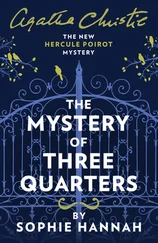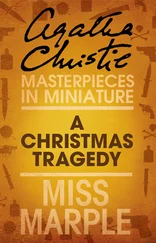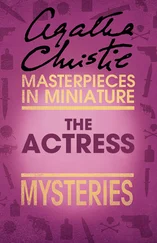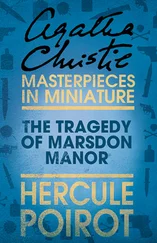Agatha Christie - Three Act Tragedy
Здесь есть возможность читать онлайн «Agatha Christie - Three Act Tragedy» весь текст электронной книги совершенно бесплатно (целиком полную версию без сокращений). В некоторых случаях можно слушать аудио, скачать через торрент в формате fb2 и присутствует краткое содержание. Жанр: Классический детектив, на английском языке. Описание произведения, (предисловие) а так же отзывы посетителей доступны на портале библиотеки ЛибКат.
- Название:Three Act Tragedy
- Автор:
- Жанр:
- Год:неизвестен
- ISBN:нет данных
- Рейтинг книги:4.5 / 5. Голосов: 2
-
Избранное:Добавить в избранное
- Отзывы:
-
Ваша оценка:
- 100
- 1
- 2
- 3
- 4
- 5
Three Act Tragedy: краткое содержание, описание и аннотация
Предлагаем к чтению аннотацию, описание, краткое содержание или предисловие (зависит от того, что написал сам автор книги «Three Act Tragedy»). Если вы не нашли необходимую информацию о книге — напишите в комментариях, мы постараемся отыскать её.
Three Act Tragedy — читать онлайн бесплатно полную книгу (весь текст) целиком
Ниже представлен текст книги, разбитый по страницам. Система сохранения места последней прочитанной страницы, позволяет с удобством читать онлайн бесплатно книгу «Three Act Tragedy», без необходимости каждый раз заново искать на чём Вы остановились. Поставьте закладку, и сможете в любой момент перейти на страницу, на которой закончили чтение.
Интервал:
Закладка:
“Then we’re to leave you to it?”
“That is my idea. For twenty-four hours.”
“Good luck to you, then. Good-night.”
As they went away together Sir Charles said to Mr. Satterthwaite:
“That chap thinks a lot of himself.”
He spoke rather coldly.
Mr. Satterthwaite smiled. That star part! So that was it. He said:
“What did you mean by saying you had other fish to fry, Sir Charles?”
On Sir Charles’s face appeared the sheepish expression that Mr. Satterthwaite knew so well from attending weddings in Hanover Square.
“Well, as a matter of fact, I – er – well, Egg and I – ”
“I’m delighted to hear it,” said Mr. Satterthwaite. “My best congratulations.”
“Of course I’m years too old for her.”
“She doesn’t think so – and she’s the best judge.”
“That’s very nice of you, Satterthwaite. You know, I’d got it into my head she was fond of young Manders.”
“I wonder what made you think that,” said Mr. Satterthwaite innocently.
“Anyway,” said Sir Charles firmly, “she isn’t… ”
26
Poirot did not have quite the uninterrupted twenty-four hours for which he had stipulated.
At twenty minutes past eleven on the following morning Egg walked in unannounced. To her amazement she found the great detective engaged in building card houses. Her face showed such lively scorn that Poirot was impelled to defend himself.
“It is not, mademoiselle, that I have become childish in my old age. No. But the building of card houses, I have always found it most stimulating to the mind. It is an old habit of mine. This morning, first thing, I go out and buy the pack of cards. Unfortunately I make an error, they are not real cards. But they do just as well.”
Egg looked more closely at the erection on the table.
She laughed.
“Good heavens, they’ve sold you Happy Families.”
“What is that you say, the Happy Families?”
“Yes, it’s a game. Children play it in the nursery.”
“Ah, well, one can compose the houses just in the same manner.”
Egg had picked up some of the cards from the table and was looking at them affectionately.
“Master Bun, the baker’s son – I always loved him. And here’s Mrs. Mug, the milkman’s wife. Oh, dear, I suppose that’s me.”
“Why is that funny picture you, mademoiselle?”
“Because of the name.”
Egg laughed at his bewildered face and then began explaining. When she had finished he said:
“Ah, it was that that Sir Charles meant last night. I wondered… Mugg – ah, yes, one says in slang, does one not, you are a mug - a fool? Naturally you would change your name. You would not like to be Lady Mugg, eh?”
Egg laughed. She said:
“Well, wish me happiness.”
“I do wish you happiness, mademoiselle. Not the brief happiness of youth, but the happiness that endures – the happiness that is built upon a rock.”
“I’ll tell Charles you call him a rock,” said Egg. “And now for what I came to see you about. I’ve been worrying and worrying about that cutting from the paper that Oliver dropped from his wallet. You know, the one Miss Wills picked up and handed back to him. It seems to me that either Oliver is telling a downright lie when he says he doesn’t remember its being there, or else it never was there . He dropped some odd bit of paper, and that woman pretended it was the nicotine cutting.”
“Why should she have done that, mademoiselle?”
“Because she wanted to get rid of it. She planted it one Oliver.”
“You mean she is a criminal?”
“Yes.”
“What was her motive?”
“It’s no good asking me that. I can only suggest that she’s a lunatic. Clever people often are rather mad. I can’t see any other reason – in fact I can’t see any motive anywhere.”
“Decidedly, that is the impasse . I should not ask you to guess at a motive. It is of myself that I ask that question without ceasing. What was the motive behind Mr. Babbington’s death? When I can answer that the case will be solved.”
“You don’t think just madness -?” suggested Egg.
“No, mademoiselle – not madness in the sense you mean. There is a reason . I must find that reason.”
“Well, good-bye,” said Egg. “I’m sorry to have disturbed you, but the idea just occurred to me. I must hurry. I’m going with Charles to the dress rehearsal of Little Dog Laughed - you know, the play Miss Wills has written for Angela Sutcliffe. It’s the first night tomorrow.”
“ Mon dieu! ” cried Poirot.
“What is it? Has anything happened?”
“Yes, indeed something has happened. An idea. A superb idea. Oh, but I have been blind – blind – ”
Egg stared at him. As though realising his eccentricity, Poirot took a hold on himself. He patted Egg on the shoulder.
“You think I am mad. Not at all. I heard what you said. You go to see The Little Dog Laughed , and Miss Sutcliffe acts in it. Go then, and pay no attention to what I have said.”
Rather doubtfully Egg departed. Left to himself, Poirot strode up and down the room muttering under his breath. His eyes hone green as any cat’s.
“ Mais oui - that explains everything. A curious motive – a very curious motive – such a motive as I have never come across before, and yet it is reasonable, and, given the circumstances, natural. Altogether a very curious case.”
He passed the table where his card house still reposed. With a sweep of his hands he swept the cards from the table.
“The happy family, I need it no longer,” he said. “The problem is solved. It only remains to act.”
He caught up his had and put on his overcoat. Then he went downstairs and the commissionaire called him a taxi. Poirot gave the address of Sir Charles’s flat.
Arrived there, he paid off the taxi, and stepped into the hall. The porter was absent taking up the lift. Poirot walked up the stairs. Just as he arrived on the second floor the door of Sir Charles’s flat opened and Miss Milray came out.
She started when she saw Poirot.
“You!”
Poirot smiled.
“Me! Or is it I? Enfin, moi! ”
Miss Milray said:
“I’m afraid you won’t find Sir Charles. He’s gone to the Babylon Theatre with Miss Lytton Gore.”
“It is not Sir Charles I seek. It is my stick that I think I have left behind one day.”
“Oh, I see. Well, if you’ll ring, Temple will find it for you. I’m sorry I can’t stop. I’m on my way to catch a train. I’m going down to Kent – to my mother.”
“I comprehend. Do not let me delay you, mademoiselle.”
He stood aside and Miss Milray passed rapidly down the stairs. She was carrying a small attaché case.
But when she had gone Poirot seemed to forget the purpose for which he had come. Instead of going on up to the landing, he turned and made his way downstairs again. He arrived at the front door just in time to see Miss Milray getting into a taxi. Another taxi was coming slowly along the kerb. Poirot raised a hand and it came to rest. He got in and directed the driver to follow the other taxi.
No surprise showed on his face when the first taxi went north and finally drew up at Paddington Station, though Paddington is an odd station from which to proceed to Kent. Poirot went to the first-class booking window and demanded a return ticket to Loomouth. The train was due to depart in five minutes. Pulling up his overcoat well about his ears, for the day was cold, Poirot ensconced himself in the corner of a first-class carriage.
They arrived at Loomouth about five o’clock. It was already growing dark. Standing back a little, Poirot heard Miss Milray being greeted by the friendly porter at the little station.
Читать дальшеИнтервал:
Закладка:
Похожие книги на «Three Act Tragedy»
Представляем Вашему вниманию похожие книги на «Three Act Tragedy» списком для выбора. Мы отобрали схожую по названию и смыслу литературу в надежде предоставить читателям больше вариантов отыскать новые, интересные, ещё непрочитанные произведения.
Обсуждение, отзывы о книге «Three Act Tragedy» и просто собственные мнения читателей. Оставьте ваши комментарии, напишите, что Вы думаете о произведении, его смысле или главных героях. Укажите что конкретно понравилось, а что нет, и почему Вы так считаете.












